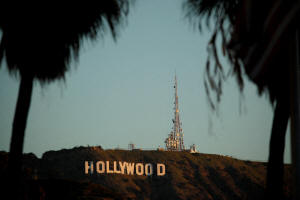Hollywood writers strike over pay in streaming TV 'gig economy'
 Send a link to a friend
Send a link to a friend
 [May 02, 2023]
By Lisa Richwine and Dawn Chmielewski [May 02, 2023]
By Lisa Richwine and Dawn Chmielewski
LOS ANGELES (Reuters) - Thousands of film and television writers were
headed to picket lines on Tuesday after union negotiators called a
strike, sending Hollywood into turmoil and disrupting TV production as
the industry wrestles with the shift to streaming. The Writers Guild of
America (WGA) said its leadership unanimously supported its first work
stoppage in 15 years after failing to reach an agreement for higher pay
from studios such as Walt Disney Co and Netflix Inc.
"The companies' behavior has created a gig economy inside a union
workforce," said the WGA, which represents roughly 11,500 writers.
The strike hits Hollywood studios at a difficult time. Conglomerates are
under pressure from Wall Street to make their streaming services
profitable after pumping billions of dollars into programming to attract
subscribers.
The rise of streaming has led to declining television ad revenue, as
traditional TV audiences shrink and advertisers go elsewhere. The threat
of a recession in the world's biggest economy also looms. The last WGA
strike in 2007 and 2008 lasted 100 days. The action cost the California
economy an estimated $2.1 billion as productions shut down and
out-of-work writers, actors and producers cut back spending.

The Alliance of Motion Picture and Television Producers (AMPTP), which
represents studios, said it had proposed "generous increases in
compensation," and was willing to increase its offer.
But it said it objected to WGA demands that "would require a company to
staff a show with a certain number of writers for a specified period of
time, whether needed or not."
Writers say they have suffered in the streaming TV boom with shorter
seasons and smaller residual payments.
"Wow. This is scary," Emmy-winning writer Ashley Nicole Black wrote on
Twitter after the strike was called. "But a future where we accept what
the companies are trying to do - low paid, freelancer writing gigs with
no job security - is much scarier."
For TV viewers, the strike's first impact will be seen on late-night
talk shows such as "Jimmy Kimmel Live" that count on teams of writers to
pen topical jokes for programs recorded on the day they are broadcast.
[to top of second column]
|

Sunrise over the Hollywood sign in Los
Angeles, California, U.S., February 6, 2020. REUTERS/Mike Blake
 Those shows are expected to
immediately start airing re-runs.
"The Late Show" host Stephen Colbert, in an episode taped just hours
before the strike was called, showed pictures of his writing staff
on screen in a gesture of support.
"They're so important to our show," said Colbert, who also is a WGA
member. "I think that the writers' demands are not unreasonable."
Other TV programming may be disrupted depending on how long the
strike lasts.
Writers said they were willing to walk off the job because changes
from streaming have made it difficult for many to earn a living in
expensive cities such as New York and Los Angeles. Half of TV series
writers now work at minimum salary levels, compared with a third in
the 2013-14 season, according to WGA statistics. Median pay for
scribes at the higher writer/producer level has fallen 4% over the
last decade.
Artificial intelligence (AI) is another issue at the bargaining
table.
The WGA wants safeguards to prevent studios from using AI to
generate new scripts from writers' previous work. Writers also want
to ensure they are not asked to rewrite draft scripts created by AI.
With a potential strike looming, production already had ground to a
halt in Los Angeles. Film LA, which issues permits for filming in
Los Angeles, said it had no shoots for scripted shows scheduled for
Tuesday or the rest of the week.
If the work stoppage becomes protracted, the networks will
increasingly fill their programming lineups with unscripted reality
shows, news magazines and reruns. It also could lead to a delay of
the fall TV season. Writing for fall shows normally starts in May or
June. Netflix may be insulated from any immediate impact because of
its global focus and access to production facilities outside of the
United States.

(Reporting by Lisa Richwine and Dawn Chmielewski in Los Angeles;
Editing by Kenneth Maxwell)
[© 2023 Thomson Reuters. All rights
reserved.] This material may not be published,
broadcast, rewritten or redistributed.
Thompson Reuters is solely responsible for this content. |